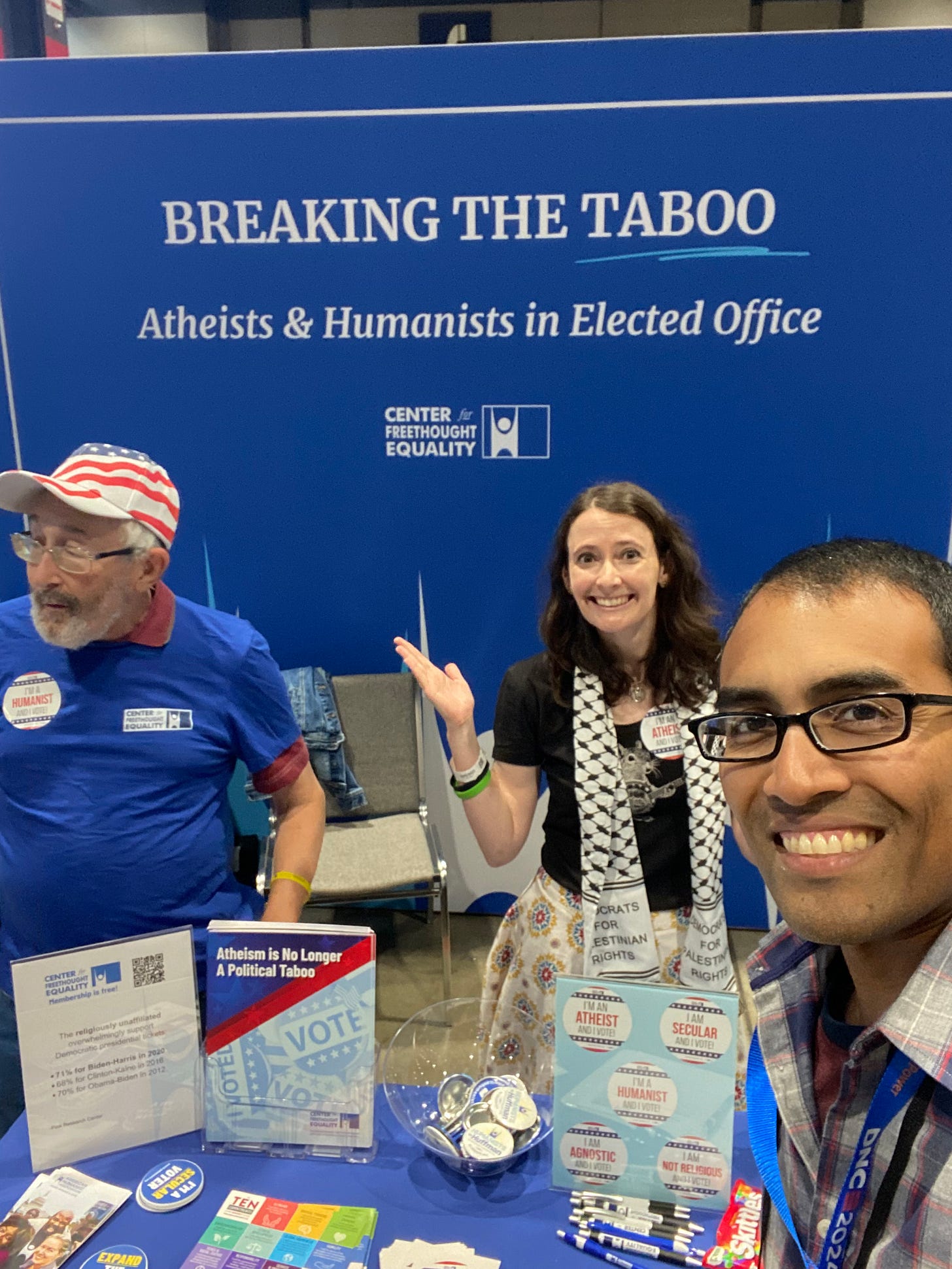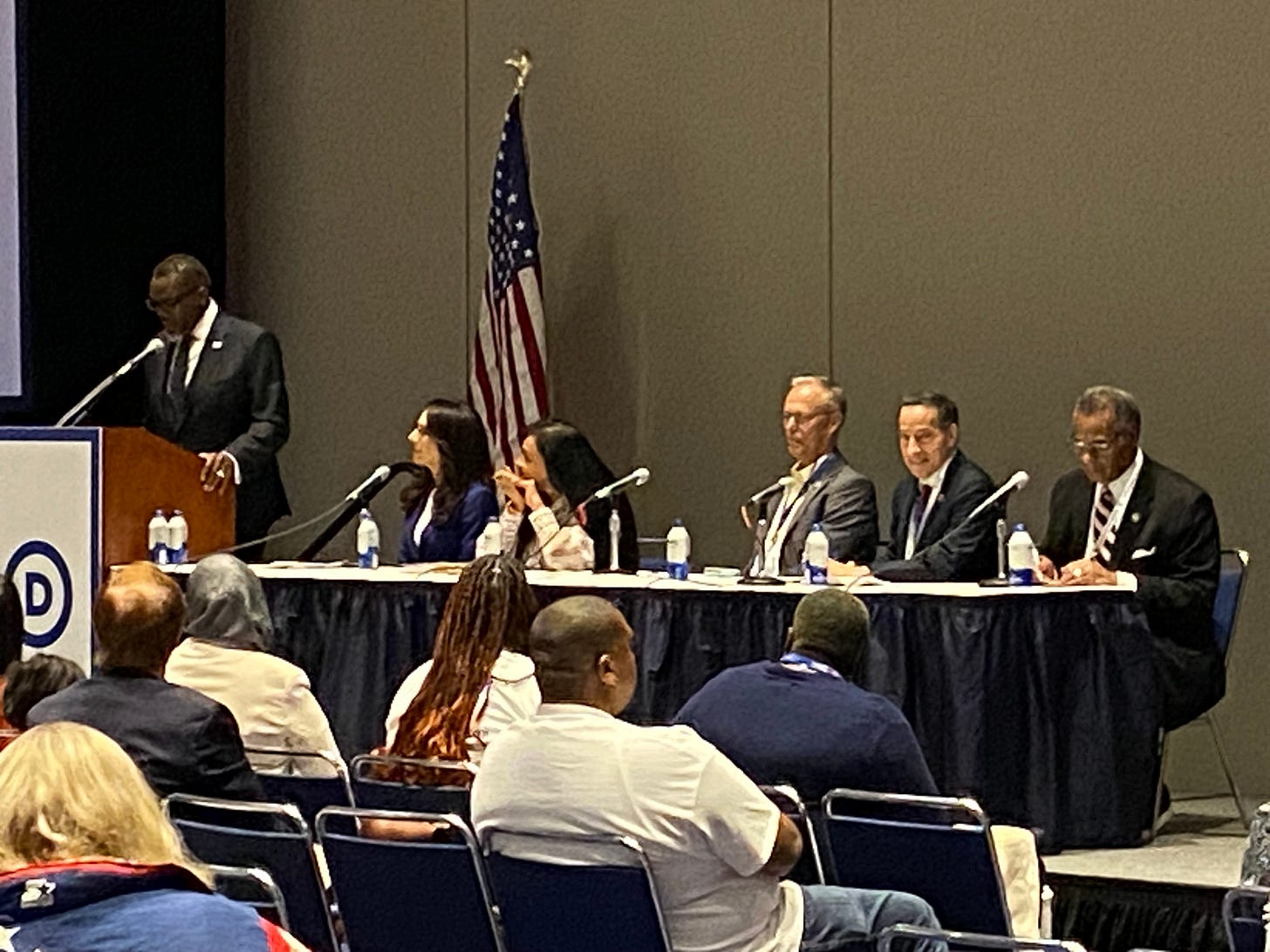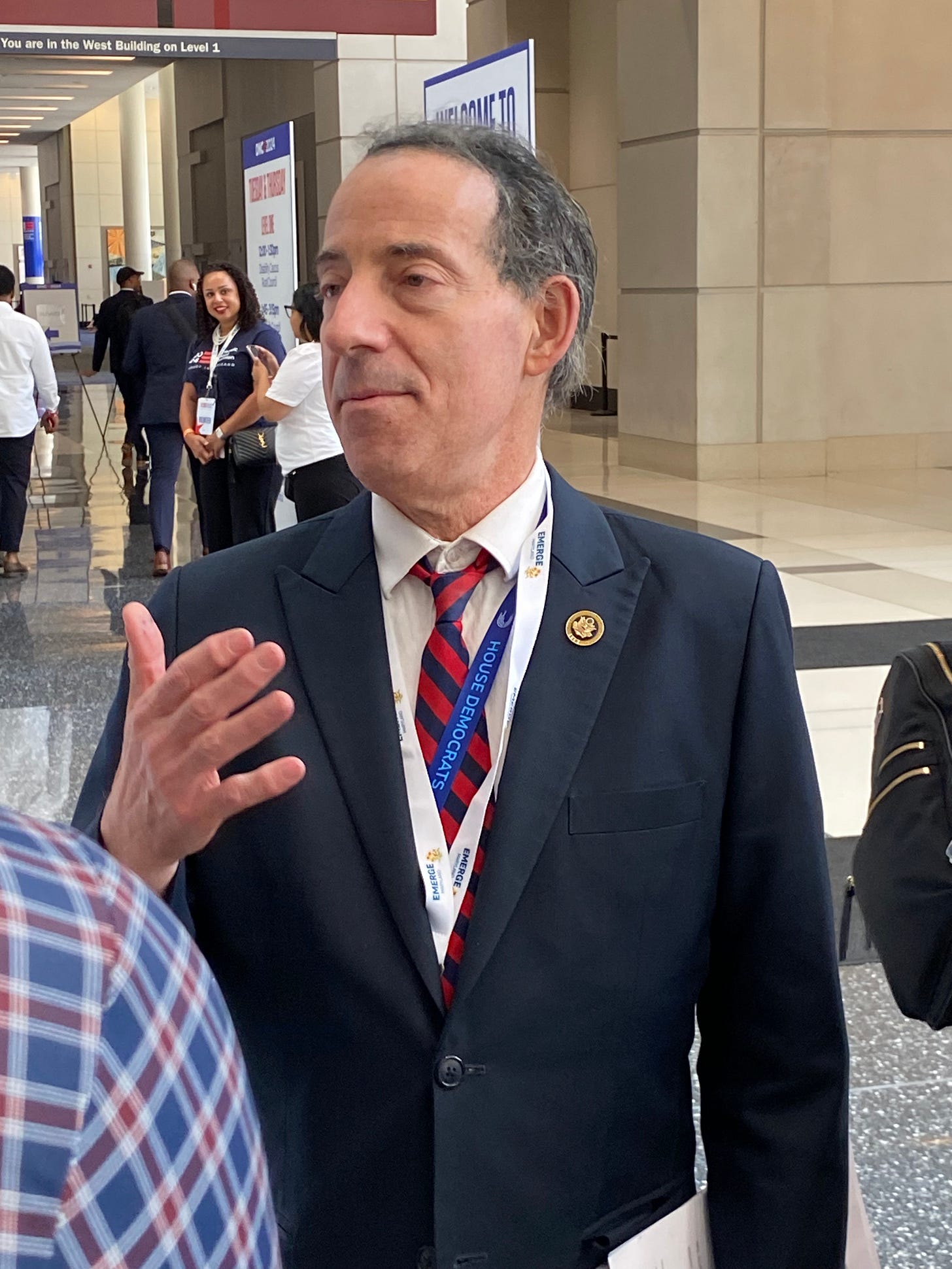A DNC panel on the dangers of Christian Nationalism
At the Democratic National Convention, the threat of Christian Nationalism was omnipresent
This newsletter is free, but it’s only able to sustain itself due to the support I receive from a small percentage of regular readers. Would you please consider becoming one of those supporters? You can use the button below to subscribe to Substack or use my usual Patreon page!
With the Democratic National Convention taking place in Chicago, I was fortunate to get a press pass to bear witness to one of the most exciting (and consequential) elections of my time.
While the nightly speakers get most of the media coverage, there was a fascinating panel Tuesday afternoon about the dangers of (white) Christian Nationalism.
Reps. Jared Huffman and Jamie Raskin, co-founders of the Congressional Freethought Caucus, and Rep. Emanuel Cleaver of Missouri were on the panel, which was run by the DNC Interfaith Council and co-sponsored by the Secular Democrats of America and Vote Common Good. Also speaking was Dr. Khyati Joshi, author of White Christian Privilege. The panel was moderated by Katherine Stewart, author of the forthcoming book Money, Lies, and God: Inside the Movement to Destroy American Democracy. (Chicago Mayor Brandon Johnson made a surprise appearance.)
One of the important takeaways, outside of Christian Nationalism itself, was that the Democratic Party has a big enough tent for people of all faiths and no faith, because we all share so many of the same values. That means we have an obligation to unite as interfaith (and non-faith) allies due to our common enemy. Our differences are important, no doubt, but there’s a common goal uniting so many of us.
When the conversation shifted to the elephant in the room, Cleaver memorably condemned the entire notion of Christian Nationalism with a simple phrase: “God shall not be pimped.” Christian Nationalism, he said, was “ignorant,” because it misconstrued our own history a la David Barton by suggesting the Founders were universally Christian, all worshiping in similar ways. They were not. They did not.
Later in the session, speaking of Huffman the Humanist, Cleaver said he was the most “non-Christian Christian” he’s ever met. (It’s a compliment.)
Stewart asked the panel: What can we do to reclaim a vision of a sunny future? Raskin responded by saying Christian Nationalism undercut our very Constitution—it denied church/state separation, called for the establishment of religion, rejected the idea of no religious test for public office, etc. Want a sunny future? Then we must push back against all that.
Raskin also brought up that his Republican colleagues have been trying to turn state-level legislation into national laws, like the Louisiana one that forces the Ten Commandments in public school classrooms. Raskin said that if that ever came to pass, he would request with the House Rules Committee that each commandment be voted on individually—and that politicians couldn’t vote in favor of any commandments they’ve ever personally violated. (His suggestions did not go over well, he joked.)
Religion and politics, Raskin added, can mix just like ethics and politics. Faith can inspire people to pass good public policy. But merging church and state, as Christian Nationalists want to do, is a non-starter. There was no contradiction in saying that, he insisted. Of course there’s a place for religion in politics—just not the way Christian Nationalists want.
Stewart then asked: Do we really have religious liberty in America or is it an illusion? Dr. Joshi said that this idea of religious freedom was “half a lie,” at least as it’s typically taught to children. That’s because while we love the idea of it, it’s not actually practiced that way. Religious freedom, she argued, is essentially a “distortion” because many people face discrimination when all they want to do is pray safely. Christianity, on the other hand, is ubiquitous in our culture. At least a certain brand of it. “This is Christian privilege,” she said, because that faith has been advantaged throughout our history.
Another question: How can we talk about the environmental challenges we face without wading into a culture war? That may not seem pertinent to the subject of Christian Nationalism, but many of the challenges to climate change legislation (to name just one type) comes from Republicans using faith as a weapon. Huffman said Christian Nationalists reject environmentalism for reasons that may have nothing to do with the science. Their wealthy donors are often on the side of fossil fuels, for example, so the environment gets shafted.
That didn’t mean everyone needed to ditch faith. Huffman spoke about how his own Humanism allowed him to find common ground with religious colleagues on these issues. If someone wants to protect the Earth because they believe God gave it to us, while he believes we must preserve it because there’s no afterlife awaiting us, there’s nothing stopping them from working together.
The Supreme Court also came up. When asked how we could address their extremism, which has elevated a right-wing kind of Christianity in the guise of religious freedom, the conversation pivoted to how we needed to reform the Court. “It starts with winning elections,” Huffman said, so that decent judges could be appointed. He didn’t mention expanding the Court or instituting term limits, unfortunately, but he called the Court “anti-democratic.” He suggested impeaching Clarence Thomas, though, and having a thorough investigation of Thomas in Congress rather than relying on excellent reporting from media outlets like ProPublica to dig up whatever they can find.
Raskin took it from there and called for ethics reform on the Court. Regarding the 18-year term limits that President Joe Biden has called for, along with a rule allowing presidents to appoint two Supreme Court justices per term, Raskin said he supported those measures but it wasn’t nearly enough. After all, even if Democrats won a trifecta in Washington and passed all kinds of major legislation (like protecting abortion rights and voting rights), the current Supreme Court could easily strike it all down. Something more was needed.
Every anti-democratic device permitted by the Constitution, Raskin said, was currently being used to hurt democracy, whether it’s gerrymandering or the Electoral College (which gives more power to smaller states). To protect democracy from Christian Nationalists, winning the election was necessary. But it was far from sufficient.

Quick sidenote: It was wonderful to see a booth set up by the Center for Freethought Equality, the political arm of the American Humanist Association, in the exhibition hall letting everyone know there is a place in elected office for Secular Americans of all stripes. (I’ll be posting more about the non-religious candidates for state and federal office later this week.)

I was told a number of visitors, included many candidates themselves, stopped by the booth to learn more. Some of them were surprised a group like this existed—but they were delighted that it did. And hopefully that means more of them will proudly run as openly non-theistic candidates in the future, with the knowledge that it won’t hurt them politically.
(All mentions of books in this post use Amazon affiliate links. I may earn a portion of any qualifying purchases.)





The second I saw the new home page of The Friendly Atheist with Jared Huffman and Jamie Raskin and the headline about "the dangers of Christian Nationalism," I was thrilled. It strikes me as way past time that some serious and formal attention was paid to the threat of Christian Nationalism, and the fact that the panel examining it is associated with the Democratic National Convention is a very big deal to me. Clearly, those involved understand the problem: that Christian Nationalism "denied church/state separation, called for the establishment of religion, rejected the idea of no religious test for public office," and they are prepared to take action to thwart CN.
What needs to happen now is that Kamala and Tim and anyone else who is concerned about CN needs to say so OUT LOUD. Even as they are calling out Project 2025, the same needs to happen with Christian Nationalism, particularly that CN isn't any kind of Christianity as I understood it as a kid. We need to tell the general public what is going on with CN and not blink when we do it.
We have seen the enemy. It's time to kick its ass!
The most clear difference between the two campaigns was on full display this week. The Democrats were talking about a bright future and positivity. On another station Trump is talking about high crime and a bad economy. His claims that Kamala will destroy our economy by continuing Biden's agenda fall on deaf ears at the DNC precisely because Biden's agenda pulled us back from the brink of a depression that Trump pushed us toward but on that other station they talk non-stop about high inflation and poor jobs reports. The best campaign options for the Dems is to continue to promote reality and get those moderate voters out to vote. The far left will vote for Kamala because they have no choice. The moderates need to realize that Kamala's views align with their views far more than Trump's views. Pushing the reality that Kamala represents a bright future for the US while Trump is a grumpy old man who only sees the worst in everything is the way to win.